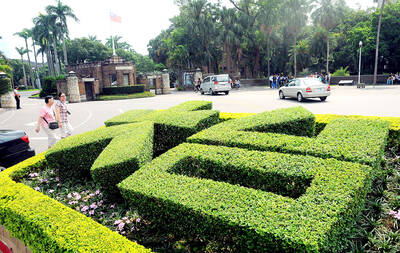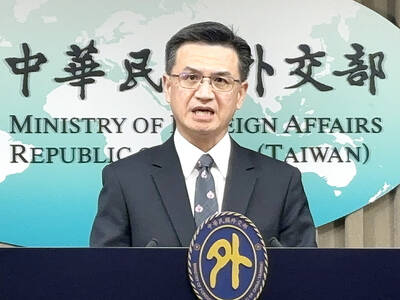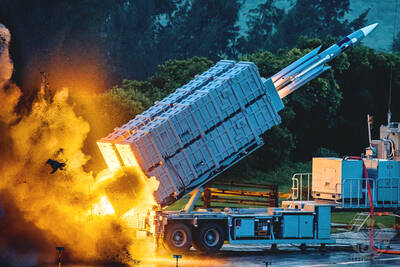President Ma Ying-jeou (馬英九) said the Democratic Progressive Party (DPP) is letting ideology prevent it from accepting the so-called “1992 consensus,” which he said does not leave Taiwan at a disadvantage, but possesses many unknown potentials.
Ma made the remarks on Saturday during an interview with online news outlet ETtoday, also discussing the cross-strait service trade agreement, DPP presidential candidate Tsai Ing-wen’s (蔡英文) recent trips to the US and Japan, and the Chinese Nationalist Party’s (KMT) imbroglio over its challenger to Tsai. Although some of his comments were quoted by other media outlets on Sunday, ETtoday did not publish the full interview until yesterday.
Ma said that the “1992 consensus” has played an integral role in cross-strait peace over the past seven years, a situation that could not continue without it.

Photo: Chu Pei-hsiung, Taipei Times
“Under the framework of the ‘1992 consensus,’ the two sides of the Taiwan Strait have been able to smoothly maintain separate governance. Now the DPP refuses to accept the consensus, but aspires to maintain peaceful cross-strait ties. That is simply impossible,” he said.
Since the consensus was designed in accordance with the Republic of China (ROC) Constitution, it definitely would not put Taiwan at a disadvantage, Ma said.
Ma said that people who are reluctant to embrace the consensus must have been swayed by ideology, which has left them “feeling pins and needles on their scalps whenever they lay eyes on the term ‘one China.’”
Dismissing criticism that the consensus was outdated, Ma said it would remain applicable to cross-strait relations for a long time.
The consensus refers to a supposed tacit understanding between the KMT and the Chinese government that both sides of the Strait acknowledge there is “one China,” with each side having its own interpretation of what “China” means. However, former Mainland Affairs Council chairman Su Chi (蘇起) in February 2006 said that he had made up the term in 2000, before the transfer of power from the KMT to the DPP.
Turning to the hurdles in the legislature related to the passing of the stalled service trade agreement with China signed in June 2013, Ma said opponents of the treaty were against the deal just for the sake of opposing it and had created a “pseudo-problem” by claiming the pact was the result of a backroom deal, simply to justify their cause.
“It seems the DPP has only one trick up its sleeve, which is to occupy the legislature. That is not democracy, but autocracy,” Ma said.
As for Tsai’s trips, the president said he would like to know what she discussed with the officials she met.
“What did Tsai say when meeting with US representatives? Did she make any promises to the Japanese? Did she meet with [Japanese Prime Minister] Shinzo Abe during her trip?” Ma said. “Tsai has not provided the public with the answers to any of these questions. Does that mean they constitute backroom dealings?”
As for allegations that he was the mastermind behind KMT Chairman Eric Chu’s (朱立倫) replacement of Deputy Legislative Speaker Hung Hsiu-chu (洪秀柱) as the KMT’s presidential candidate, Ma said that whoever started the rumor overestimated his clout and abilities.
“I have rarely handled party affairs since my resignation as KMT chairman last year, except those directly associated with the government’s policies,” Ma said.
Hung was replaced for two reasons — her cross-strait policies had undermined the KMT’s electoral advantage in maintaining cross-strait ties, and the dismal campaign momentum of the party’s legislative candidates, he said.

Taiwan has experienced its most significant improvement in the QS World University Rankings by Subject, data provided on Sunday by international higher education analyst Quacquarelli Symonds (QS) showed. Compared with last year’s edition of the rankings, which measure academic excellence and influence, Taiwanese universities made great improvements in the H Index metric, which evaluates research productivity and its impact, with a notable 30 percent increase overall, QS said. Taiwanese universities also made notable progress in the Citations per Paper metric, which measures the impact of research, achieving a 13 percent increase. Taiwanese universities gained 10 percent in Academic Reputation, but declined 18 percent

Chinese President Xi Jinping (習近平) yesterday met with former president Ma Ying-jeou (馬英九) at the Great Hall of the People in Beijing, with Xi’s opening statement once more emphasizing that people on both sides of the Taiwan Strait are Chinese and that foreign intervention cannot change their inevitable unification. Xi said that 5,000 years of history of zhonghua minzu (中華民族, ethnic Chinese group) have seen their ancestors move to Taiwan to establish new lives, while also documenting them fighting side-by-side against foreign forces and finally freeing Taiwan. “Both sides are Chinese,” and there are no issues that cannot be worked through, he

BULLY TACTICS: Beijing has continued its incursions into Taiwan’s airspace even as Xi Jinping talked about Taiwan being part of the Chinese family and nation China should stop its coercion of Taiwan and respect mainstream public opinion in Taiwan about sovereignty if its expression of goodwill is genuine, the Ministry of Foreign Affairs (MOFA) said yesterday. Ministry spokesman Jeff Liu (劉永健) made the comment in response to media queries about a meeting between former president Ma Ying-jeou (馬英九) and Chinese President Xi Jinping (習近平) the previous day. Ma voiced support for the so-called “1992 consensus,” while Xi said that although the two sides of the Taiwan Strait have “different systems,” this does not change the fact that they are “part of the same country,” and that “external

UNDER DISCUSSION: The combatant command would integrate fast attack boat and anti-ship missile groups to defend waters closest to the coastline, a source said The military could establish a new combatant command as early as 2026, which would be tasked with defending Taiwan’s territorial waters 24 nautical miles (44.4km) from the nation’s coastline, a source familiar with the matter said yesterday. The new command, which would fall under the Naval Command Headquarters, would be led by a vice admiral and integrate existing fast attack boat and anti-ship missile groups, along with the Naval Maritime Surveillance and Reconnaissance Command, said the source, who asked to remain anonymous. It could be launched by 2026, but details are being discussed and no final timetable has been announced, the source